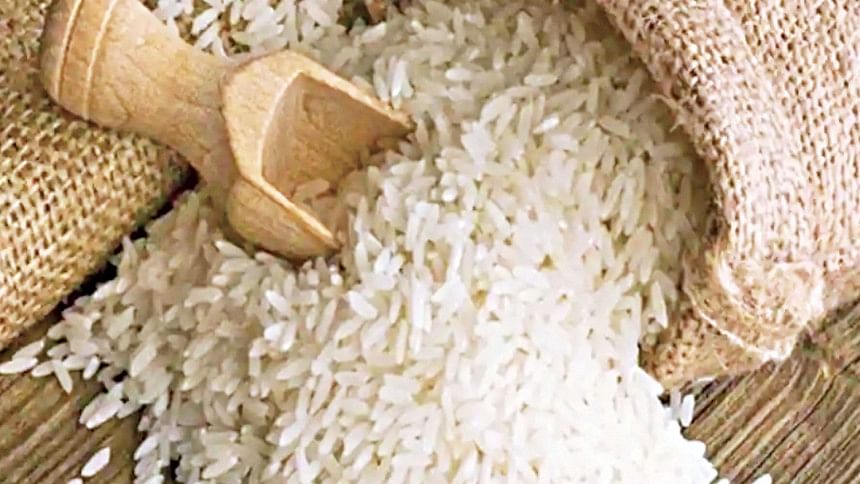Rice stock still scarce

Despite taking aggressive measures to import rice in the last three months, the government has so far failed to replenish the country's depleting grain stocks.
The current stock of food grain is at its lowest in the last few years.
Both the cabinet committee on economic affairs and purchase approved a number of proposals in the past three months to import a total of 15.5 lakh tonnes of rice under government-to-government (G-to-G) arrangement and through international tenders.
The latest move to import rice came yesterday, when the two cabinet committees approved two proposals to import 1.5 lakh tonnes of rice from India.
During yesterday's cabinet meetings, chaired by Finance Minister AHM Mustafa Kamal, the cabinet committee on economic affairs approved the food department's proposal to import one lakh tonnes of rice from Indian state-owned National Federation of Farmer's Procurement, Processing and Retailing Cooperatives India (NACOF).
The rice would be imported under a G-to-G basis.
Meanwhile, the cabinet committee on purchase approved another proposal from the food department to import 50,000 tonnes of non-basmati boiled rice from India's M/S PK Agri Link at the cost of Tk 174.66 crore through an international tender.
The price of rice would be around $411.93 per tonne. With yesterday's move, the government has so far taken the initiative to import 15.5 lakh tonnes of rice. In February, separate agreements were signed to import 4 lakh tonnes of rice, including 3 lakh tonnes through international tenders and one lakh tonnes from India under a G-to-G arrangement.
On March 3, the government took the initiative to import 5.5 lakh tonnes of rice through an international open tender.
To expedite this import, the Economic Affairs Committee approved a proposal to shorten the bidding process from 42 days to 10 or faster.
On March 10, the government approved three proposals to import a total of 3.5 lakh tonnes of rice from India, Thailand and Vietnam under state -to-state arrangements.
The purchase committee then approved two more proposals with each involving the import of 50,000 tonnes of rice on March 24 and March 31.
During a press briefing yesterday, the finance minister said that the government approved the proposals to import rice in quantities that are required by the country.
"But when a supplier fails to provide the shipment in a timely manner, we change it and proceed for another source," Kamal said, adding that the food ministry is aligned with the agricultural ministry to decide on how much rice the country requires.
The decisions are taken based on the country's current requirement as well as keeping the next harvest in mind.
"We will not purchase more than what is required because that will be harmful for local farmers and we won't buy less either so that the consumers don't suffer," Kamal said.
Earlier on April 4, the finance minister informed during a parliament session that the government aims to import one million tonnes of rice this year to ensure food security.
He also said that the government had allocated sufficient funds in the budget to this end.
"We have already finalised agreements to import five lakh tonnes of rice, of which 1.5 lakh tonnes has been imported and the remaining is on the way," Kamal said while presenting a report on budget implementation in the first six months of the current fiscal.
However, the rice imports have yet to gain momentum.
The government has so far managed to import only 2.16 lakh tonnes of rice from July 1 last year to April 5 this year, according to the Food Department.
The proposals approved to import rice under a G-to-G basis have yet to be finalised while those proposals have not been placed before the purchase committee.
Food Secretary Mosammat Nazmanara Khanum could not be reached for a comment in this regard despite repeated attempts by the time this report was filed.
Rice and wheat stocks at public storages dipped to 4.88 lakh tonnes, of which 3.99 lakh tonnes was rice as of April 5, data from the food ministry shows.
On July 1 last year, the country's food stock stood at 11.88 lakh tonnes while it was 16.74 lakh tonnes on July 1, 2019.
The stock started falling in June last year as distribution under the social safety net and other government programmes continued despite sluggish procurement.
Farmers and millers refrained from selling food grains to the food office at the government-fixed rates as the prices were soaring.
An increase in distribution of cereal among those affected by the Covid-19 pandemic and recurring floods also contributed to the drop in stocks, food ministry officials said.
The depleting stock and the failure to procure sufficient quantities of paddy directly from growers forced the government to pay cash under its Test Relief and Food for Work programmes.
More LNG purchase approved
The cabinet committee on purchase also approved a proposal to purchase another 33.6 lakh MMBTUs of liquified natural gas from the spot market.
The proposal, submitted by Petro Bangla, a corporation of the energy and mineral resources division, was to purchase the LNG from AOT Trading AG, Switzerland, at a cost of Tk 243.30 crore.
Each MMBUT will cost $l7.28.
Finance Minister on support for low-income people
Asked about what steps would be taken for the low-income people who lost their jobs during the recent countrywide lockdown, the finance minister assured that necessary and timely measures would be taken to ensure the safety and security of the people."
However, the finance minister did not mention any such step in particular.
"Another wing of the government works on it and they can inform about it," he added.
When it was mentioned that all stimulus packages announced last year were implemented through the finance ministry, Kamal said that the prime minister fixed those packages and the ministry implemented them on her behalf.
"The ministry will work for the people's welfare and do things so that people of the country are not harmed," he added.


 For all latest news, follow The Daily Star's Google News channel.
For all latest news, follow The Daily Star's Google News channel. 




Comments